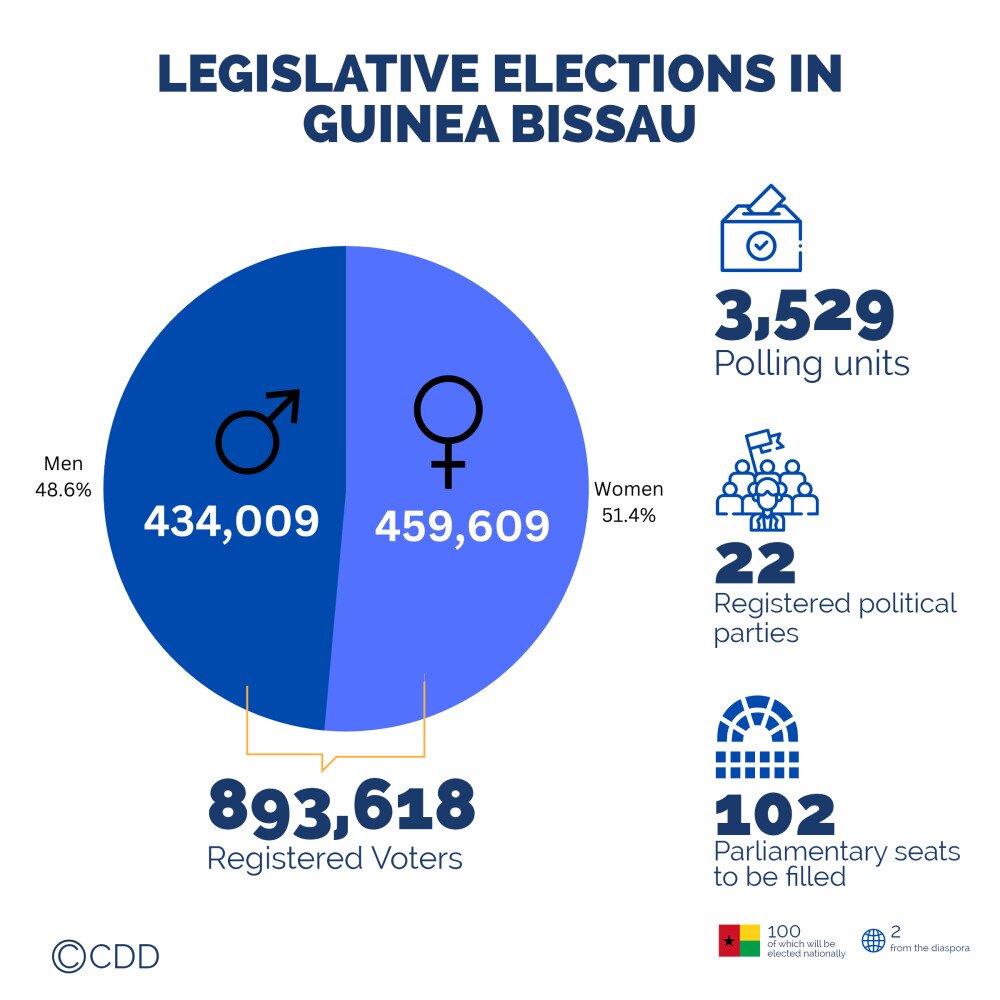
Will the legislative elections guarantee a return to political stability in Guinea Bissau?
After a failed coup d’état in February 2022, a hurriedly dissolved parliament in May 2022 and the postponed legislative elections in December 2022, the highly anticipated June 4, 2023 elections in Guinea Bissau present an opportunity for the consolidation of the country’s threatened democracy. As Bissau Guineans head to the polls to elect 102 legislators, there is anticipation that this election will restore normalcy to the country’s administration which has been unstable since 2015. This high anticipation underlines the interest and wide mobilization of international and regional observers including the United Nations, the African Union and the Economic Community of West African States (ECOWAS). However, the actions of political actors in the lead up to the polls significantly challenge these expectations.
Being a semi-presidential republic with a dual executive system, Guinea Bissau’s Presidents and Prime Ministers are often at political logger heads. Since 2015, Guinea-Bissau has been in a protracted political crisis which started when the immediate past President, José Mário Vaz, who won as the PAIGC candidate in 2014, dismissed Domingos Simes Pereira, his prime minister and the party leader. During his five year term as President, Vaz worked with seven prime ministers which is a sign of the level of political instability that characterized his administration. Upon his election in 2019, President Umaru Sissoko Embalo’s administration has also been a tell tale of political tensions and instability with the high point of tensions being his dissolution of parliament in May 2022.
Before the dissolution of the defunct parliament, a triumvirate of political parties virtually monopolized the parliamentary seats: Madem G1 –the party of the incumbent President, the African Party for the Independence of Guinea and Cape Verde (PAIGC), founded by Amilcar Cabral and the Party for Social Renewal (PRS). Intra-party dissents and power struggles within the PAIGC continue to mar the party since 2014, resulting in a decline in PAIGC seats from 57 to 47 in the National Assembly,as well as the loss of the presidential election. Madem G15, Embalo’s party also now seeks to advance into PAIGC strongholds like the country’s east. It remains to be seen how these party dynamics will inform the 4 June vote given the newly born coalitions and the President’s vested interest.

Given the determining influence of the winning party over power distribution within the government, the June 4 polls are a key determinant for the tide of democracy in Guinea Bissau. President Embalo aims to transition Guinea-Bissau to a presidential system, necessitating a new constitution. Requiring the support of three-fifths of the parliamentary deputies, this constitutional reform has been a major source of political division. The post-election balance of power will determine how feasible such a reform will be.
With 893,618 registered voters, voter turnout rate in Guinea Bissau is habitually high with a usual turnout rate of over 80%. The anticipation and tension that has characterized the June 4 vote hints at a continuation of the high voter turnout trend. Though there are 22 political parties registered to contest at the polls, only six are active with seats in the National Parliament.
Though the national election body is yet to issue figures of women candidates, the general understanding is that the number of women candidates is low. In the dissolved parliament, women represented 13.7% of the 102 seats. Though this figure is not one of the worst in the sub-region, it is an anomaly given that women are the majority in the population with 51.6% and constitute 51.4% of registered voters. Despite the existence of a parity law that requires political parties to ensure a 36% women representation on their candidate list, the reality is different.
The credibility of the National Electoral Commission (NEC) has also been in question in the lead up to the legislative elections. Though significant reforms were introduced in 2016 with the goal of minimizing political influence on the electoral process, further reform attempts have faced politically motivated obstacles. The Commission’s credibility was also undermined by post-electoral disputes in 2019, triggering a power struggle among present political actors.
The campaign season which lasted from May 13 till June 2 saw political actors make statements that raised concerns among observers. There have also been warnings against rigging and manipulation of election results. President Embalo's declaration that he would not appoint Domingo Perera as Prime Minister, even if Perera’s Party, the PAIGC wins, are also disconcerting. This is because such an eventuality could trigger an institutional crisis with unpredictable consequences.
With the one-year mandate of the Guinea-Bissau Stabilization Support Mission led by ECOWAS coming to an end soon, it is crucial to ensure that political actors do not engage in actions that could reignite conflict and destabilize the country once again. Continued engagement and collaboration between ECOWAS and other regional stakeholders are necessary to maintain peacekeeping efforts and provide the necessary support to prevent a relapse into violence. The anticipated focus should be on fostering dialogue, promoting reconciliation, and addressing the root causes of political instability to create a sustainable and peaceful future for Guinea Bissau.
The successful consolidation of democracy in Guinea Bissau hinges not only on the peaceful conduct of the elections but also on the willingness and commitment of political actors to accepting and respecting its outcome. It is essential for all parties involved to prioritize the principles of democratic governance, respect for the rule of law, and peaceful resolution of disputes. By upholding these values, Guinea Bissau can move towards a more stable and inclusive political environment.
Dr. Lassane Ouedraogo is a research fellow at the Centre for Democracy and Development (CDD West Africa). He is an affiliated lecturer at Universite Libre du Burkina and Universite Joseph Ki-Zerbo in Burkina Faso.
Pelumi Obisesan-Aina is a doctoral candidate at SOAS, University of London, and a visiting researcher at the Centre for Democracy and Development.
